
If you don’t know Jen Richards’ name, you know her work.
As one of the leading, outspoken activists in the transgender rights movement, she’s penned essays and maintained an active social media presence advocating for acceptance of transgender people. Her argument against casting cisgender men as transgender women in films and television started an international movement, waking Hollywood to the talent of transgender performers.
As an artist, Richards created and starred in the popular web series Her Story, beginning in 2016. The series helped launch Richards’ career as a creative writer and actress, as well as that of her costar, Angelica Ross.
2019 saw Ms. Richards give two widely praised performances, the first as young Anna Madrigal on Netflix’s Tales of the City revival. The second came this fall with the HBO comedy Mrs. Fletcher. In the show, Richards plays Margot, a writing professor and sometime life coach of the title divorcee, played by Kathryn Hahn.
How about we take this to the next level?
Our newsletter is like a refreshing cocktail (or mocktail) of LGBTQ+ entertainment and pop culture, served up with a side of eye-candy.
Queerty caught up with Richards just ahead of the Mrs. Fletcher season finale to talk about her rising career, her activism and the state of transgender politics. The final episode of Mrs. Fletcher airs December 8 on HBO.
So the show is amazing. How did Margo come to you?
Well actually, before they made the TV show, I was one of the narrators of the audiobook. They had a couple different people read it. For Margot’s section they wanted a transwoman. Then the audition came up that HBO was doing a pilot. Neither the casting people nor my agent realized I’d already done the audiobook.
Seriously?
Yeah. So I came in with a little bit of an advantage. And I had read with the casting director several years earlier, so we caught up and talked about changes in trans representation for about 20 minutes. I was kind of in my professorial mode. By the time my audition started, she was like you kind of are this character, aren’t you?
[Laughter]
So it was a very stress-free audition. I was at my best. So I booked the pilot and things went into limbo a little bit. Then we started over again. But over the course of all of that, I got to know Tom [Perotta, author of Mrs. Fletcher and series executive producer]. Tom got to know me, I got to know the writer’s room. And the story shifted, and the character shifted to sort of accommodate me.
That’s pretty incredible. So what changes were made? Did you make suggestions? Or did things just evolve organically, as part of the development process?
Well, of course, it is a process with many people involved. The first time I met with Tom, I did say that I was a little concerned that Margot was kind of a trope.
How so?
Well there are two tropes that show up in trans representation: what we call the “pathetic” and the “deceptive.” The deceptive is the young, usually transwoman of color, who tricks a straight guy. The pathetic is the older, late transitioning, married white guy who’s kind of pathetic, like [Maura, played by Jeffery Tambor] in Transparent, or Caitlyn Jenner.
Ok.
So I just pointed out that Margot fits the cliché. She’s late transitioning. She’s married with kids. She is a former basketball star, so tall and athletic. It’s not that it wasn’t a well-thought out character, and she was based on people that Tom actually new. These cliches are usually based in some level of truth. But I told him I don’t really fit that. I’m too long into transition. I’m not that large. And to Tom’s credit, he encouraged that kind of dialogue. He’s a straight, white cis guy who knows he’s a straight, white cis guy and that he has blind spots. He’s so collaborative.
Wonderful.
So once the door was open, I felt permission to take ownership of Margot and kind of shape it. So that’s one of many ways. Instead of being married to a woman with kids, she has a relationship with a guy. Instead of being a professor of gender studies—which seemed a little on the nose—she’s a writing professor. So it was little changes to make her a stronger character. There’s certainly geekiness, and there’s a level of self-possession in that she can command the class and take clumsy questions and handle them with grace.
Those are things I love about the character. I particularly love that she’s the moral voice of the piece. She’s the one that guides Eve through her own life transitions.
Yes. And it’s one thing to see it on the page in a script. It’s only as I’m watching that I realize I’m the narrator. That was a nice thing I discovered in watching it.
Really?
Well yeah. In real life, you’re never going to be somebody else’s narrator. She’s a teacher and trying to get by in a sh*tty job and trying to date. So I think that’s just good directing and good editing.
And a good performance on your part.
Well, I like the chemistry that Kathryn and I have on screen. That just feels so natural. She’s an amazing costar. I really felt like we met as equals—not as people out in the world, but on the set.

One of the big themes of the show is transformation. For a character like Eve, that means redefining her identity outside of marriage and motherhood. That also means sexual exploration. For Margot, that’s referenced by her gender confirmation. I found the scene where they discuss changing their names quite touching for some reason.
Well you have an advantage. For that finale scene, I improvised a monologue and did many, many versions of it. So I don’t know what’s in the finale.
Related: How Nikita Dragun, a trans woman, schooled Victoria’s Secret & launched her own cosmetics line
Oh wow.
So I don’t even know what you’re talking about. I don’t know what they went with!
[Laughter]
Ok then, well, let me ask you about one of the themes of this show: sexual tension. Everybody in this series has eyes for somebody, but they seem too shy to act on it. That’s true for Margot and Curtis. The show treats their story in a very matter-of-fact way. I love, by the way, that he’s not hung up on the fact that Margot is transgender, or on what kind of genitals she might have. Is that a step forward? Is that ignoring an elephant in the room? Societally, do we obsess too much over genitals?
Yes, to all of that. From the start, I’ll say when I met with Tom and we talked about wanting to avoid the trope and make something that was a step forward, I said that the most interesting thing about Margot was her relationship with Curtis. That’s what I wanted to explore. We don’t see many heterosexual/trans relationships on screen, or interracial ones at that.
Right.
Then, to their credit, they found ways to do that. So you could look at it and say they avoided sex with a transwoman. But there’s a kind of irony in the show, in that the queerest person has the most chaste romance. I kind of love that, particularly because trans women are so often depicted and overrepresented in pornography. I thought it was sweet. It doesn’t imply that those conversations aren’t had between Curtis and Margot. We don’t know.
Right.
If there were a second season, I’d love to explore Margot’s sex life and how she navigates that. But I kind of like that it was simple, and I think it’s a big step forward that Margot isn’t defined by her transness. In other words, her character isn’t just there to be trans and teach Eve a lesson. She’s a whole person with her own storyline. I think it’s something so simple and anticlimactic that you miss how revolutionary that really is. That banality is actually dramatic for trans people.
Yeah.
I’ve had a lot of trans people write to me about how powerful it was for them to see Margot out at a bar, or hanging out with Eve at a party, or slow dancing with Curtis. She’s not hiding. She’s out in the world.
Related: Lauren Morelli hadn’t heard of ‘Tales of the City’ before Netflix asked her to write a new series
And the show doesn’t hide her either.
One of my favorite moments is when she asks Curtis if he’s ever dated a transwoman before. And he says no and asks if she’s ever dated a black person. And she’s like, yes.
[Laughter]
So just in the one word you get a sense that there’s a past there. There’s experience. I think that’s really lovely.
Well, and I have to say, I like that the show—and you as well—refer to it as a hetero relationship. That both shoots down the idea of the trope you mention, the deceptive transwoman. And I feel like there’s also a bum rap on straight men that do date transwomen. They’re not secretly gay, which is sort of the stereotype or the implication from mainstream culture.
Oh no, not even the implication. It’s usually an overt statement that any man who likes transwomen is secretly gay on some level. And people argue against that because they say it invalidates [transgender] womanhood. Listen, I would love it if gay men dated me!
[Laughter]
It would be fantastic. I would date gay men in a heartbeat. The fact is, the men who date us tend to be straight. This is borne out by all the research on pornography. When PornHub releases their statistics of men in their own home, it shows that the men who watch trans porn watch straight porn. They watch women. They don’t watch gay porn. The men who watch gay porn don’t watch trans porn. There’s very little overlap. For most of the population, they can’t get that, so they seize on it and calls every man who likes a transwoman “gay.” That leads those men, because they’re not and don’t want to be seen that way, to keeping it in private, in secret. And that allows the cycle to continue.

Right on. Do you think, is that rooted in a sort of sexism—a sort of masculinity worship?
Absolutely. Everything in our culture is rooted in patriarchy and misogyny. There’s no way around that. I’m bisexual, and so that’s where I notice it more. There’s a sense that if you’re bisexual as a man, you’re really gay.
Yes.
And if you’re bisexual as a woman, you’re really straight. So clearly, what that means, is you really like men. And if you’re a guy who has 99 female relationships and one male relationship, you’re really gay. If you’re a woman that has 99 female relationships and one male relationship, you’re really straight. That says a lot to me. That puts a lot of weight on men defining sexuality.
That’s interesting, if bizarre.
It is. And that’s the deep misogyny. And it’s f*cked up.
It is. And that also perhaps speaks to the fear that the genders have of one another, which baffles me. Men assume women are deceptive and manipulative. Women assume men are threatening and violent. Of course, violent men and deceptive women do exist, but I hope we’re not all like that. Good lord.
I will say, that as a woman who dates straight men, you quickly learn how cautious you have to be, how common [violence against woman] is.
That’s scary.
Again, this a symptom of patriarchy. Straight men tend to be incredibly entitled. I’m writing a TV show right now about a man who kills women, so I’m probably not the one to ask about men right now!
[Laughter]
Fair enough. We appreciate this disclosure. Mrs. Fletcher is the second much-acclaimed, high profile role you’ve had this year after Tales of the City. We loved you as young Anna Madrigal…though I have to ask, did you anticipate a backlash because Olympia Dukakis, who is cisgender, was playing a transwoman? Granted, she’d been doing it for 25 years, but I talked to a lot of people in the business who were afraid of the reception.
Yeah?
And I should also add that this was before anyone knew you were in the show; that was a very closely guarded secret.
I can explain this very cogently, in fact. I made a really compelling argument on Twitter a few years ago that basically said when cis men play trans women, it leads to violence against transwomen. And the way I laid out that argument really changed the industry. I’ve had hundreds of emails from producers and writers saying that’s how it clicked for them why it’s bad to cast men as transwomen. When Jared Leto or Jeffery Tambor or whoever accept their awards for playing a transwoman, we’re seeing men.
Yes.
And that reinforces the notion that, at the end of the day, trans women aren’t women, they’re men, as opposed to myself or Laverne [Cox] or Trace [Lysette] or Angelica [Ross] or whoever, we’re women 24/7. And that can lead to violence. And that argument really took off. It changed the industry for the better, and I’m super proud of that.
Of course.
But in our kind of hyper-cautious culture, the bottom line became “you can’t have cis people play trans people.” For me, it was never that. It’s much more nuanced. For me, when cis men play trans women, it leads to violence. Of course, I do think trans people should play trans people. I think it makes for better art. You don’t have to play the transition, you can play a character. And obviously, if we can’t play ourselves, we can’t get a foothold in the industry. So there are a million reasons why trans people should play trans people.

I understand.
So that’s why even when I first wrote about it…I’m kind of ok with Olympia Dukakis or Famke Janssen or whoever else playing a transwoman. Obviously I would prefer to have those parts, but at least that still emphasizes [a transwoman] is a woman.
Yes.
Regardless of her past, the character is a woman. So I think younger people who weren’t familiar with Tales of the City, who had kind of gotten on board with this notion that it’s always bad for cis people to play trans people, I think that’s what they were thinking.
Sure.
But again, there is the legacy issue, that Olympia spent years playing this character, and played it wonderfully with love and respect and dignity. She’s a whole complicated character, and transition is a small part of her story. Plus, I just don’t think it’s that bad. So that’s the short version.
That’s fantastic. So in a similar vein, were you nervous about taking the role of young Anna and still having Olympia play older Anna?
Nervous is a gross understatement. I was terrified.
Really?
This is a part, six episodes in the original series, plus another twelve in the sequels, that’s played by an actress that I revere. I can’t tell you how many times I’ve watched Moonstruck.
Right.
So just on that level, it’s terrifying. Then when I got the script, I was like oh my God. The whole episode is me. There is this intense emotional journey. There’s falling in love and heartbreak. There’s betrayal. It’s so much emotional work to do that’s packed in so tightly. And you have to believe that when she steps off the bus as a newly-out transwoman from the midwest, that by the last scene, she has become the Anna that we know. That’s a lot.
[Laughter]
I was so intimidated. I even told Alan [Poul] our director. I was trying to rise to the part. I thought Lauren Morelli wrote the script so beautifully. I love the nuance and complications of it. I was terrified of failing the script. It deserved a superlative performance, and I didn’t know if I could do it.
Wow.
So that night, Laura Linney showed up in my hotel room.
Good lord.
She gave me this three-hour master class in how she works on a script and breaks it down. She taught me voice stuff. Ironically, Alan’s biggest concern was that my voice is so much higher than Olympia’s, so I had to lower my voice to match a cis woman.
[Laughter]
Laura just said “I’m on set every day. I’m your resource.” So I took all the tools she gave me. It was the hardest I ever worked on anything in my life. Word by word, I worked that episode. Alan’s probably the best director I’ve ever worked with in my life. Luke Kirby, I don’t think I’ve worked with a better costar. Daniela Vega, my amazing other costar. It’s the best thing I’ve ever been a part of, the most joy I’ve ever had.

Well, and Tales is one of the best series of the year, and that episode is a crown jewel. With that in mind, have you noticed a difference in the kinds of roles you’re offered? You’ve been coming up in Hollywood a long time.
It’s gotten better, unequivocally. But it’s like going from one mile per hour to five miles per hour. It’s a huge change, but listen. Subjectively speaking, I’ve been in several network shows. I did Tales of the City. I’m a regular on Mrs. Fletcher. And I don’t have any work.
What?
I haven’t had any work in a year. I get a few auditions a year. That’s just the reality. Trace & Laverne talk about that in a recent article. Trace is one of the most high profile trans actors and didn’t even make enough last year to get insurance. There just aren’t parts for us. We’re not considered for parts that aren’t trans, and there aren’t that many trans parts. And a lot of those tend to be written poorly, and I don’t want to do them. It’s better, but it’s not good.
Yeah.
I feel lucky to have two great parts happen in the same year. I’m super grateful for that. And that I haven’t booked anything new is softened by that fact. But other parts I’ve had are from [knowing people]. I don’t even get auditions. It’d be one thing if I went in and got a fair shot, but I don’t even get a fair shot at them.
That’s so disappointing and frustrating.
Yes it is. But it is so much better than it was. Four years ago when I came out to do Her Story, I just assumed there wouldn’t been any parts at all. I’ve been acting since I was six months old—33 years. I did Shakespeare in Chicago and trained. I was always the lead actor. But when I transitioned, I knew that was over. I thought I would never act again. So the fact that I have had some parts is a miracle to me. But we have a long way to go.
I love what you say about creating your own opportunities. That is a notion, by the way, that is not unique to trans people or queer people. For anyone wanting to start in the business, creating your own opportunities is so important.
I think that’s true across marginalized communities. Lena Waithe is so hot right now, and that’s because someone gave her a chance to write an episode on [How to Rock]. Then, suddenly, everybody noticed [her talent]. Hollywood is fundamentally a conservative community. It’s a for-profit industry. They’re not there to make social good. They’re there to make money. We forget that sometimes.
Yes.
So they’re not going to try something new and untested. Laverne once told me, before any of us had done anything, before she’d done Orange is the New Black, she said “Nobody in Hollywood wants to be the first. They want to be the second.” And frankly, Pose is the first. And that took Ryan Murphy having so much power and turning to people like Janet [Mock] and Steve [Cannals] and saying “Do your thing.”
Well said.
And I always tell younger people who want to act or write, you have to be great. It’s not fair, but so many mediocre white people make it where other people cannot succeed. So it’s not enough to be good. You have to be undeniable. It’s not fair, but that’s where we’re at. Hopefully, it will keep getting better. I hope before I die I can see a bunch of really crappy trans performances.
[Laughter]
Really crappy performances in really mediocre movies granted through nepotism? That’s how you know you’ve made it as a people. Though, let it be said, this year has seen an explosion of transgender talent on both sides of the screen with Pose, Tales of the City, Mrs. Fletcher.
Brian Michael Smith really excites me. He’s a black, trans, male actor who is staying with me right now. He’s shooting in LA. For a while, it’s just been transwomen coming on the scene, and transmen have been invisible. But the community is half and half. To see him go from The L Word to this 9-1-1 spinoff where he’s a series regular is revolutionary.

Absolutely. There are also directors like Silas Howard, Rhys Ernst…
Oh yeah, we’re all friends. It’s a small world. We all know each other, the trans creators. Once you realize there’s a trans person out there making good sh*t, you just know each other. So Silas and I are very close. We’ve worked on a number of projects out there. Angelica [Ross] and I lived together for two years while we were working on Her Story.
Oh really?
Yeah. That’s her first screen role. She’s always been a star. It just took a while for the public to catch on. And the girl doesn’t sleep. I would watch her work, pass out fully clothed with her laptop, sleep for a few hours, wake up, and go back to work.
Oh my goodness. So before we drift too far from your work, you mention roles you’ve turned down. What is it that strikes you in a role that signals it’s transphobic or exploitative?
It’s just something you know. You can feel if a part is using a transperson to further and end or mocking or punishing. You see it on the page. There was one project where I took the audition just to connect with the team and tell them “Don’t do this. It doesn’t work.” And they did it anyway, and it failed. They were just using a transperson as a plot device.
So last question, what are you writing right now?
I’m actually writing a true-crime series for Pretty Matches, Sarah Jessica Parker’s production company. It is still in the early stages, but it’s a six-part limited series, a true story. It’s dark, but it’s a story I really, really want to tell. Then I have a project about queer and trans kids in Kentucky, but that hasn’t found a home yet. And I’m pitching a bunch of other projects.
Mrs. Fletcher airs on HBO December 8.







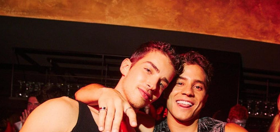
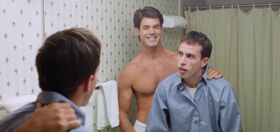


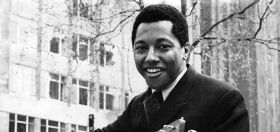
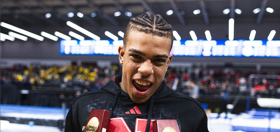


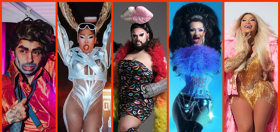

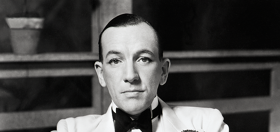
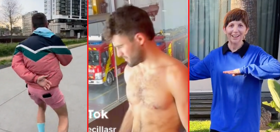
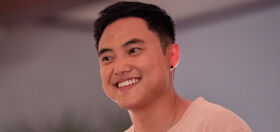

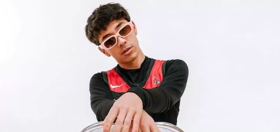
MacNchz
I didn’t recognize Richards from her appearance in TALES OF THE CITY. I greatly enjoyed that performance and this.
David Reddish conducts an interesting and thoughtful conversation, and having done such myself, I recognize Richards seems like a very forthcoming person who is easy to interview. I’m kind of bummed that some of Richards’ activist claims aren’t probed.
Women are frequently perceived as deceptive, because that is how patriarchy has portrayed them for centuries. Remember: Eve brought the apple to Adam and was punished for it. What was Adam’s penalty? Being thrown out of the Garden of Eden. Meanwhile, Eve and all her female descendants are stricken with menstruation and painful childbirth.
Men bringing violence is borne out by facts and statistics: a majority of violent crimes are perpetrated by men, particularly violent crimes against women.
What isn’t so clear is Richards’ claim that cis-men playing trans-women results in violence against trans-women. How does that work, exactly? It’s a jarring statement.
How does Richards recommend a trans woman actor portray a character prior to transition? It would seem the flip-side of her contention that having trans actors in trans roles is that trans actors should ONLY play trans roles — after all, isn’t a heterosexual portraying a heterosexual “better for the art?”
I’ve read the complaints that devolve to “next you’ll be defending blackface.” Should actors who aren’t surgeons or politicians or wizards in real life be playing those roles?
inbama
It is reasonable to argue that not casting trans in trans roles makes it near impossible for most to have an acting career, but the idea that actors cannot transcend their own sexual orientations and gender identities is a lie.
That said, had the elder Anna Madrigal not been played by a well-known known woman like Olympia Dukakis, there would have been no mystery at the heart of “Tales In The City.” When the blackmailer’s revelation was made know, everyone would’ve just shrugged.